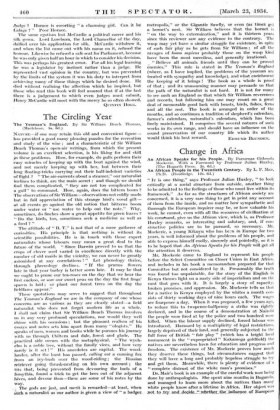The Circling Year
;The Yeoman's England. By Si William Beach Thomas. (Maclehose. 8s. 6d.)
NATURE—if one may retain this old and convenient figure—. has provided a good many pleasing puzzles for the recreation and study of the wise ; and a characteristic of Sir William Beach Thomas's open-air writings, from which the present volume is an excellent selection, is his liking for and skill in these problems. How, for example, do gulls perform their
easy miracles of keeping up with the boat against the wind, and not merely keeping up with her, but between their
long floating-tricks carrying out their half-indolent varieties of flight ? " The air-currents about a steamer," our naturalist inclines to think, are the main secret ; and though we should lind them complicated, " they are not too complicated for a gull" to command. How, again, does the bittern boom ? The observations of Sir William—observations not coldly made but in full appreciation of this strange bird's vocal gift- -at all events go against the old notion that bitterns boom Under water or " use water to help out the note." Why, sometimes, do finches show a great appetite for green leaves ? " Do the birds, too, sometimes seek a medicine as well as a food ? "
• The attitude of " B. T." is not that of a mere gatherer of curiosities. His principle is that nothing is without its scientific possibilities. He is in touch with those expert naturalists whose labours may mean a great deal to the future of the world. " Since Darwin proved to us that the crops of clover seed varied in excellence directly with the number of old maids in the vicinity, we can never be greatly , astonished at any correlations ! " Let phenology thrive, through phrenology declines. " If the prunus flowers late in that year barley is better sown late. It may be that we ought to prune our tea-roses on the day that we hear the first cuckoo, or sow our sweet peas on the day the first frogs' spawn is laid ; or plant our forest trees on the day the fieldfares appear."
These quotations may serve to suggest that throughout The Yeoman's England we are in the company of one whose concerns are as various as they are clearly stated—a field naturalist who does not forget modern life as a whole.
I shall not claim that Sir William Beach Thomas involves us in any very profound speculations, nor would they well Chime with his occasions ; but the pleasant realism of his essays and notes sets him apart from many " ologists." He Speaks of men, women and books while he pursues his journey with us through Chiltern and dale, forest and glade. The
practical side occurs with the metaphysical. " The wych- elm is a noble tree, without the family vices, and how very , rarely is it set ! " His anecdotes are capital. The wood- kinder, after the hunt has passed, calling out a cunning fox from an ivy-bush over the wood-riding ; the RuSsian retriever going thrush-nesting on his own account ; the tits that, being prevented from devouring the buds of a forsythia, found a trick to get the bees out of the adjacent • hives, and devour them—these are some of his notes by the way.
. The gods are just, and merit is rewarded—at least, when such a naturalist as our author is given a view of " a badger.,
metropolis," cif the Gigantic Sawfly, Or evert (as time$ go) a hornet's nest. Sir William believes that the hornet is " on the way to extermination," and it is thirteen years since this reviewer saw any evidence to the contrary. The wasp may yet have a similar struggle for existence, in spite of such fair play as he gets from Sir William ; of all the ravages of homo sapiens probably those on the wasp kind have been the most merciless, and generally irrational.
" Believe all animals friends until they can be proved enemies." This rule is stated in The Yeoman's England (where, as I have implied, the problems of the yeoman are treated with sympathy and knowledge), and what enrichment the keeping of it brings I The book as a whole is proof of that ; and its unassuming manner may persuade us that the path of the naturalist is not hard. It is not for many to see such an England as that which Sir William reverences and records, but following him one may count on a great deal of memorable good luck with beasts, birds, fishes, ferns and all the rest. The book is arranged in order of the months, and so continues a tradition of shepherd's calendars, farmer's calendars, naturalist's calendars, which has been finely maintained. It comprises the several natures of such works in its own range, and should have an influence on the sound preservation of our country life which its author






























































 Previous page
Previous page